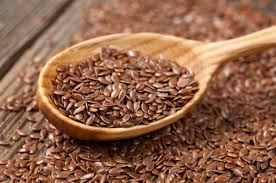Scientists are warning that eating too much flaxseed could cause cyanide poisoning.
 Also known as linseed, it is rich in fibre, omega-3 fatty acids and micronutrients, and in the current trend is added to breakfast cereal or blended into smoothies.
Also known as linseed, it is rich in fibre, omega-3 fatty acids and micronutrients, and in the current trend is added to breakfast cereal or blended into smoothies.
But the seeds also contain a naturally occurring compound called amygdalin, a type of ‘cyanogenic glycoside’ that can produce cyanide gas as it degrades.
Scientists are warning that eating too much ground flaxseed could cause cyanide poisoning and adults could end up ill if they consume just three teaspoons of it in one sitting
Stephen Adams of the Daily Mail reports more cyanide is released if the flaxseed has been ground – a form in which it is commonly sold, as the seeds themselves are quite hard.
Now scientists at the European Food Safety Authority (EFSA) have published a report warning that eating as little as a third of a teaspoon of ground flaxseed can be dangerous for a small child.
Adults could end up ill if they consume just three teaspoons of it at one sitting. Signs of cyanide poisoning include headache, confusion, agitation, irregular heart beat and trouble breathing. In severe cases, it can be lethal.
Long-term damage including neurological problems can result from repeated exposure.



.jpg) Dr Young said.
Dr Young said.